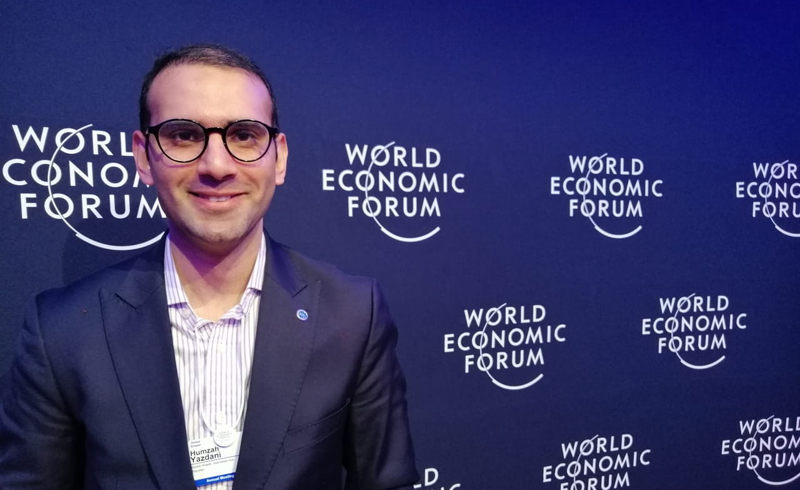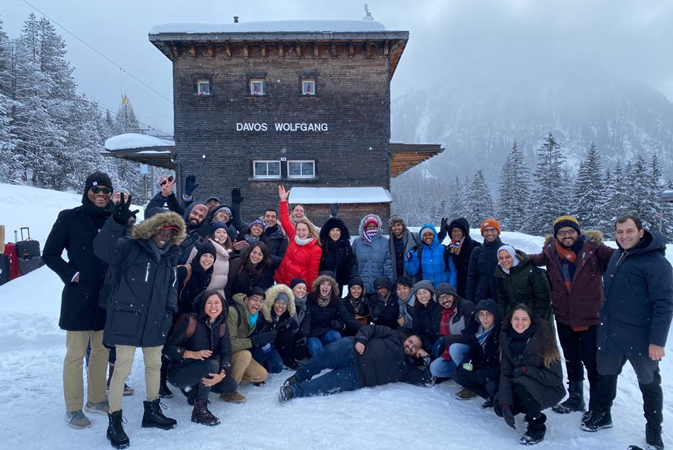Our correspondent speaks to the young Pakistani man, who made it to the World Economic Forum on merit and sheer determination. Humzah Yazdani is a part of the Global Shapers Community, which is an initiative of the WEF. This year, he was selected to be a part of the Davos 50. Proud to be a Pakistani, Mr Yazdani has a lot to tell us about his experience and journey. Humzah is a barrister from Lincoln’s Inn. He is currently pursuing his second postgraduate from the University of Texas School of Law in “Global Energy and Environmental Law” on a Fulbright scholarship. He is also the 2019-2020 MD Anderson Research Fellow at the Institute for Transnational Law.
What is the Global Shapers program and could you describe your role regarding this?
The Global Shapers community is an initiative of the World Economic Forum (WEF) to mobilise the youth all over the world. There are approximately 400 hubs globally, and the idea is that young people, between the ages of 20 and 33, can use this platform to undertake grassroots/community-level projects, be thought leaders within our communities and engage in policy debates to provide the youth’s perspective and concerns. Every year, the WEF selects 50 young people from around the world to be a part of its Annual Meeting in Davos and be a part of the dialogue with the world’s political, social and business leaders. This year, I was fortunate enough to be selected as part of that delegation.
How did it feel to be part of the Davos 50 this year (as a Pakistani) and be inside the Congress Centre?
It was quite a surreal experience. I have the utmost respect for Prof. Klaus Shwab and WEF for believing in the voice of youth and our concerns, and for ensuring that we share the platform with the world’s leaders and to give us the opportunity to engage and debate with them. On my first day there, I was standing in the lobby, having lunch and within 5 minutes of being there, I had Greta Thunberg, Ivanka Trump, and Avram Glazer all pass by me. You initially wonder how you even got there but within a day you get so used to all of it. A fair amount of representation from Pakistan was good to see. Our Prime Minister was one of the 12 heads of state, out of a total of 53 who were attending, to address the Congress Hall, which was lovely to see. Most importantly, though, it is an incredible learning experience. My current research is about managing the clean energy transition and the role that carbon pricing plays in that transition. I got the opportunity to meet and discuss these issues with sector experts from all over the world, including Al Gore and Jennifer Morgan, the Executive Director of Greenpeace.
How has being a Global Shaper helped you?
The idea behind joining the Global Shapers was to do some good in the community. The other motivation was that rather than working in silos, being part of a local and global community really helps amplify that impact in a more meaningful way. We all should endeavour to use our privileges and advantages for the benefit of our society, however we can. One of the constant reminders that we get at the Global Shapers Community is that one should not be ashamed of their privilege, but one should be ashamed of not using that privilege for the benefit of their communities. I would though say that the opportunity to meet and network with young people from all over the world and from all walks of life doing incredible work has been a wonderful experience. Additionally, it is so essential to have these frequent exchanges with people from all parts of the world because you realise how similar everyone is. There is more that unites us all than what divides us. In fact, that was my suggestion to the UN Secretary-General when I met him at Davos to facilitate and promote such cultural exchanges. What I love about this community is the sheer diversity. We have people with such diverse backgrounds – social entrepreneurs (a lot of them), filmmakers, architects, educationalists, journalists, psychologists, policymakers, scientists, community workers. It’s this diversity of people that makes the community so wonderful and close to my heart.
 Could you tell us a bit about your HUB in Islamabad and its achievements?
Could you tell us a bit about your HUB in Islamabad and its achievements?
The Islamabad Hub of the Global Shapers Community started in 2013 and since then, we have routinely engaged in a variety of projects. It’s a volunteer organisation and we accept applications every year around Oct/Nov. At present, we have 28 members. We routinely engage in community projects. Some of the projects that we have undertaken are:
GS collaboration with World Trade Organization – The Islamabad Hub was one of the few Hubs of the Global Shapers Community that submitted a Local Consultation Report, as a part of GSC’s participation in the WTO Public Forum Workshop–Trade 2030 and The Fourth Industrial Revolution (Bringing the Vision and Thoughts of the Youth to the World).
Leaders of the Future Bootcamp (LFB) – Boot camps aim to develop the capacity of young leaders around the challenges and opportunities of the 4th Industrial Revolution by sharing knowledge, providing training on networking skills and connecting young people to the larger ecosystem.
Treelionnaire – an annual tree plantation,
Muskaan – a bi-annual event, in collaboration with another organization run by Mr Amer Qureshi, for the cancer child at PIMS (Pakistan Institute of Medical Sciences).
Food and Ration Drives
Child Safety Project – The project is underway, and the aim is to overcome the challenge in an underprivileged community to look after the welfare and safety of children and ensure development while parents are at work.
 What do you see yourself for the future?
What do you see yourself for the future?
Somehow contribute towards eradicating, or at least bridging, the ever-increasing inequalities, especially the homelessness, and help manage the clean energy transition with workable solutions. WEF is a wonderful network to collaborate with some really intelligent people, and I hope to make the most of that. I also hope that the present government has imminent plans to increase our energy generation from carbon-free sources and curb our pollution problem. It is heartening to see that our PM is an avid environmentalist and I really hope Pakistan develops clear directions in these areas. Hopefully, I will be able to contribute in that respect as well.
A message to the readers
Be aware of three inherent biases in all of us – cognitive, confirmation and availability biases and know that they drive our perspectives and opinions. I would encourage everyone to read books, explore more, and engage with people from other cultures, people you disagree with, and who you perceive to be different from you. The more we associate ourselves with people who hold the same views as ourselves, the more our worldview gets validated and, in the process, we become more rigid with those biases further ingrained. I would encourage everyone to at least curb, if not overcome, these biases and to develop a more nuanced perspective in life.





